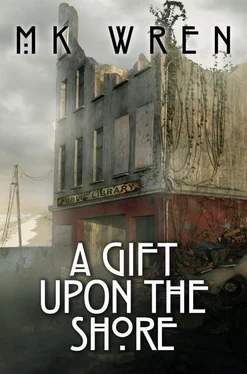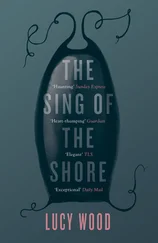“Where are the dogs?” Rachel asked.
Mary found it an effort to speak. “Shadow’s in the house. I saw her when I took the last load to the basement.”
Rachel nodded, called Topaz. She seemed to materialize out of the fading light from near the breezeway gate, and Rachel knelt to stroke her head. “Sweet lady, you don’t know what the hell’s going on. Neither do I, love, neither do—” Her voice caught, and Mary expected the break in her underlying silence, the iron silence that bound her grief.
But it didn’t come.
Rachel rose and went to the gate. Mary followed her into the breezeway. The astringent smell of the firewood stacked against the house was oddly reassuring; she could hear a soft chirking from the chicken coop behind the garage.
And a throaty, distant rumble.
She thought herself inured to terror now. But she had only become inured to horror. This was terror, striking hard at the solar plexus.
What she heard was the sound of a motor. A car.
“Rachel?”
She had heard it, too. She turned and went back to the gate. Mary stood beside her, breath caught, listening.
Rachel whispered, “It’s coming up our road.”
Mary nodded. It could, of course, be quite innocent. A lost tourist, perhaps. It might even be an Apie patrol.
There. Lights glimmering through the trees.
Topaz whined impatiently, but she didn’t bark. Maybe the car was familiar to her. Now the lights flashed around the curve; the pitch of the motor changed as the car slowed. The gate. Whoever was driving had seen the gate.
Mary stared at the twin points of light. It occurred to her that she should go call the Apies, but at that moment the motor roared and the car hit the gate with a clanging crash, plunged through, one-eyed now, careened down the road toward the house. Topaz began barking, and Rachel shouted, “Mary, are there any lights on in the house?”
“No, I didn’t turn any on except in the basement, and I know I turned that one off .”
“Maybe they’ll think the house is empty. That gives us the advantage of surprise.” And she brought her rifle up into firing position, resting the barrel on the top of the gate.
Mary stared at Rachel, suddenly transformed into a steady-handed guerrilla soldier, ready to kill. The rumble of the motor reverberated in a numbing crescendo, and Mary was struck with a new kind of fear. I can’t kill anyone .
It was then that she recognized the vehicle roaring toward them; there was just enough light left.
Jim Acres’s old brown Dodge van.
And within her, after this day of hideous revelations, terror found a channel into rage.
Topaz barked manically, and the van lurched across the lawn, a hubcap spinning off, flashing away in the skewed light of the remaining headlight. Mary snapped off the rifle’s safety, felt the polished wood against her cheek, relished the potent weight of the weapon as she watched the last seconds of the van’s approach through the scope, cross hairs centered on the windshield, on the glowing skull mask behind it.
The van slewed to a stop, both front doors swung open, the side door slammed back, and Rovers spilled out. Six—no, seven, eight raffish scarecrows in fluorescent paint, all laughing and shouting in demented camaraderie, staggering stoned. “ Tice diggin for the take! ” Had they said the same thing last night at the Acres house?
Mary fixed one in the cross hairs, squeezed off a shot. The recoil pounded her shoulder, the muzzle flash startled her, and her ears were numbed by the report, yet she heard a yelp as the Rover jerked back, fell writhing. Rachel’s gun cracked while Mary lined her sights on another skull-faced figure, this one with an automatic snugged in his hands. She fired, and a spray of bullets smashed into the walls of the house, but they were high, and the gun tumbled to the ground as he fell.
Another fluorescent apparition dived for it. Rachel’s shot dropped him. Shouted obscenities and Topaz’s barking filled a millisecond before Mary and Rachel pulled off shots almost in unison, before Mary saw another Rover move out from behind the van with another automatic. She fired, shouting, “Get down!” and crouched behind the gate as the top of it vanished in a shower of splinters. But the Rover was wounded, and Rachel sprang up to fire again as soon as the burst ended. Mary saw the remaining Rovers running for the van, fired five more rounds, and Rachel yelled, “Mary, let them go!”
Mary hadn’t assimilated that command when something hit her shoulder. A piece of wood. Topaz had climbed to the top of the stacked wood, dislodging wedges of fir. Mary grabbed for her, caught only more falling wood, and Topaz leapt over the gate, landed running, charging the last Rover while he scrambled for the van. Rachel cried, “ Topaz! ” and fumbled at the latch. Mary tried to get a shot at the Rover as Topaz closed in on him. His steel-toed boot lashed out, and Topaz howled, hurtled backward. Rachel threw the gate open and ran for Topaz, but not before the Rover took a long step, and with vicious deliberation, kicked the dog again.
Mary fired without aiming, staying a few paces behind Rachel, and the Rover made a dash for the van, jerked crazily at the impact of one of Mary’s bullets as his mates pulled him in the side door. The van wobbled into reverse, and Rachel fired shot after shot at it. Flashes of light in the open side window—another automatic—but Rachel stood firm, oblivious. Mary dropped to the ground to join Rachel’s desperate fusillade, while the van lurched toward the gate.
And it vanished in a ball of blinding light. The concussion hit like a hard slap against Mary’s ears.
Dazed, she stared at the incandescent ball, watched it expand, then shrink until the shape of the van emerged, black against yellow flames.
And she began to laugh. Taste of your own medicine, you bastards! She felt no remorse nor even pity for the people burned to death in that van. She lay in the clover-scented grass and laughed. Until she saw a face in the grass not a yard away, the fluorescent skull smeared, glowing in the light of the fire.
One of the Rovers. Dead. A woman. Strange, she hadn’t really thought of the Rovers as being male or female any more than she’d thought of them as being human.
This face was human beneath the painted mask. Now it was human, now that it was dead.
Mary heard a sobbing cry, and it wasn’t her own.
In the flickering glare of firelight, she saw Rachel huddled over Topaz. Mary stumbled to her, sank to her knees beside her.
Rachel’s silence had been broken. She wept now, sobs that racked her body, made her seem frail and small. Topaz lay on her side, every breath a whimper of pain, her eyes edged with crescents of white. Mary touched her flank, felt the crushed ribs soft under her palm, and her hand came away wet with blood. Her eyes burned, but she wouldn’t give in to tears now. Throughout this terrifying day, Rachel had held back her tears. Now, Mary knew, it was her turn.
Rachel said, “Damn it, there’s no vet within a hundred miles. Connie—she could’ve helped… oh, Connie…” The name ended in a keening cry.
Topaz coughed and whined, blood spattering out of her mouth. Mary said huskily, “Rachel, she can’t survive this.”
“I know.” Those two words seemed a tangible weight, and the speaking of them bowed her down into a crouch. She stroked Topaz’s head, whispered, “But I can’t… kill her. Oh, my sweet Topaz, I haven’t the courage….”
“I’ll take care of it.” And even as she spoke, Mary wondered if she could do what she must to put Topaz out of her misery. Kill her. Rachel at least didn’t sink to the euphemism. Mary looked down at her own bloody hand. She had, with no remorse, taken part in killing eight people tonight. Yet she shrank at killing this agony-stricken animal out of kindness.
Читать дальше












